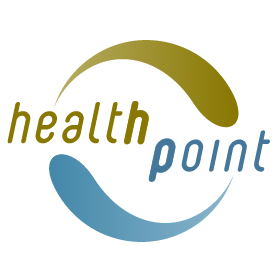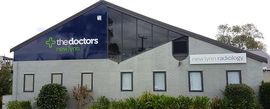West Auckland > GPs / Accident & Urgent Medical Care > National Hauora Coalition >
The Doctors New Lynn
General Practice (GP) Service
Today
9:00 AM to 3:00 PM.
Covid-19 testing
GP practice - enrolled and casual patients
This practice provides Covid-19 testing to enrolled and casual patients. Please call the practice for more information.
Description
We are a CORNERSTONE Accredited Practice. We provide a comprehensive, convenient and very affordable family healthcare service with a radiology department, physiotherapy, pharmacy, eye specialist and child care centre on site as well. We offer a number of specialised programmes including immunisations, travel vaccinations, visiting midwives, ongoing screening for breast and cervical cancer, and wellness and healthy ageing clinics.
Minor surgical procedures include excision of skin lesions and lumps, circumcisions, skin grafts, skin flaps, repair of minor hand injuries, extensor tendon, digital nerve and nail bed lacerations, repair of complex lacerations of the face and elsewhere in the body and removal of foreign bodies.
Also available is traditional Chinese acupuncture and a GP service for residential care facilities.
We are fully computerised, allowing us to access laboratory results straight from the lab. We keep our patient fees at a very affordable level. Our staff speak numerous different languages including Mandarin and Cantonese.
Our services include:
- Elder care
- Nurse specialty clinics
- Weight management clinic
- Minor surgery
- Special skin surgery procedures
- Visiting midwives
- Circumcisions
- Acupuncture
- Spirometry / Audiometry
- Occupational health
- Immigration medicals
- Chronic care
- Diabetes clinic
- Physiotherapy
- Podiatrist
- Orthopaedic service / Fracture clinics
Our standard consultation time is 15 minutes.
To read more, please visit our website here.
Staff
Our team is made up of 12 GPs (see details below under “Doctors”) and:
Clinical Director: Dr Gary Wu
Medical Centre Manager: Kirsty Vester
Nurse Lead: Sheryl Anand
Practice Administrator: Nancy Li
Click here to meet our doctors.
Here at The Doctors, New Lynn, we are fortunate to have the services of Dr Adnan Ali, who worked as a Plastic Surgery MOSS (Medical Officer Special Scale) in New Zealand and as a fully qualified plastic surgeon in Iraq. As a member of the senior medical staff at Middlemore Hospital, Dr Ali was in charge of the ECLAOP (Emergency Centre Local Anaesthesia Outpatient Procedures) Dec 2005 - Dec 2007 and has enabled us to provide an extensive range of elective and emergency surgical options under local anaesthesia.
Doctors
-
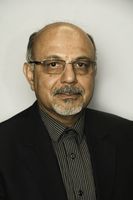
Dr Adnan Ali
General Practitioner with a special interest in skin cancer, hand surgery and management of burns
-

Dr Jonathan Chang
General Practitioner
-

Dr Wai Cheong
General Practitioner
-

Dr Hilary Goh
General Practitioner
-
Dr Mina Han
General Practitioner
-

Dr Qiuyu Jin
General Practitioner
-

Dr Saville Marquis
General Practitioner - Vocationally Registered
-

Dr Sanaa Salman
General Practitioner - Vocationally Registered
-
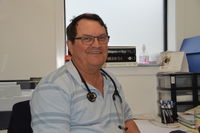
Dr Charles Sanders
General Practitioner - Vocationally Registered
-
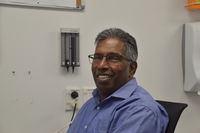
Dr Kathirgamu Sinnathamby
General Practitioner - Vocationally Registered
-
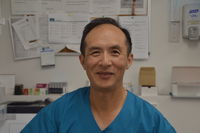
Dr Bing-Cheng Wang
General Practitioner - Vocationally Registered
-
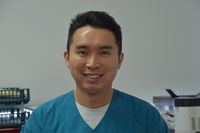
Dr Gary Wu
General Practitioner - Vocationally Registered
How do I access this service?
Enrolled patients
Make an appointment
Appointments can be booked via The Doctors App or from our website, or by phoning the practice during opening hours.
Walk in
Limited numbers of walk in appointments are available.
Website / App
The Doctors New Lynn uses The Doctors App. This App can be downloaded from the Apple App Store or the Google Play Store. The practice code is NEWL.
Casual (not enrolled) patients
Enrolling new patients
Yes
This practice is enrolling new patients.
Fees
GP consultations weekdays enrolled patients
| Under 14 years | free |
|---|---|
| 14-17 years | $13.00 |
| 18-24 years | $ 19.50 |
| 25-44 years | $ 19.50 |
| 45-64 years | $ 19.50 |
| 65+ years | $ 19.50 |
A weekend and public holiday surcharge also applies.
For more details of our charges for casual or International visitors and for ACC consults, special procedures, nurse consults etc, please enquire at reception.
Hours
9:00 AM to 3:00 PM.
| Mon – Fri | 8:00 AM – 7:00 PM |
|---|---|
| Sat – Sun | 9:00 AM – 3:00 PM |
CLOSED BETWEEN 1-2PM for STAFF MEETING/Training on Wednesdays
Due to the high infection rates of COVID-19 we are offering phone consultations. However, our doctors will assess if our patients require a face-to-face consultation. Please be mindful we are required to COVID-19 screen patients prior to entering our medical care centre.
Public Holidays: Open on all public holidays The following public holidays differ to standard opening hours: Labour Day (28 Oct, 9:00 AM – 3:00 PM), Auckland Anniversary (27 Jan, 8:00 AM – 3:00 PM), Waitangi Day (6 Feb, 9:00 AM – 3:00 PM), Good Friday (18 Apr, 9:00 AM – 3:00 PM), Easter Monday (21 Apr, 9:00 AM – 3:00 PM), ANZAC Day (25 Apr, 9:00 AM – 3:00 PM), King's Birthday (2 Jun, 9:00 AM – 3:00 PM), Matariki (20 Jun, 9:00 AM – 3:00 PM).
Covid testing hours - for GP practices, if hours differ to standard hours
9:00 AM to 12:00 PM.
| Mon – Fri | 8:00 AM – 5:00 PM |
|---|---|
| Sat – Sun | 9:00 AM – 12:00 PM |
Please note our drive through COVID-19 swabbing service stops taking swabs at 4:00pm during the week and at 12pm on the weekend if there is a large demand. However, if there is no queue we can offer the COVID swabbing service on the weekend until 2:45pm.
Public Holidays: Closed Labour Day (28 Oct), Auckland Anniversary (27 Jan), Waitangi Day (6 Feb), Good Friday (18 Apr), Easter Sunday (20 Apr), Easter Monday (21 Apr), ANZAC Day (25 Apr), King's Birthday (2 Jun), Matariki (20 Jun).
Languages Spoken
Arabic, Cantonese Chinese, English, Mandarin Chinese, Māori, Samoan, Tamil, Tongan
Services Provided
Immunisation is the safest and most effective way to provide protection for you and your tamariki’s health. For more information view the NZ immunisation schedule.
Immunisation is the safest and most effective way to provide protection for you and your tamariki’s health. For more information view the NZ immunisation schedule.
- Pregnancy vaccinations
- Childhood immunisation programme
- 45 year old vaccinations
- 65 year old vaccinations
- Adult flu vaccine
- Child flu vaccine
- Diphtheria / Tetanus / Pertussis (whooping cough) vaccine
- Human Papillomavirus (HPV) vaccine
- Measles / Mumps / Rubella (MMR) vaccine
- Meningococcal vaccine
- Shingles vaccine
- Travel vaccinations
Immunisation is the safest and most effective way to provide protection for you and your tamariki’s health. For more information view the NZ immunisation schedule.
Your GP's surgery is far more than a place to go when you are feeling unwell and needing a quick cure. The doctor who sees you has gone through an extensive medical training to equip her or him to help children and adults of all ages with a range of physical and emotional difficulties. GPs are at the centre of the healthcare hub and will be aware of services and expertise that are available locally and further-a-field. GPs are also aware of the link that stress and unhappy life events have on physical health so know when to suggest a talking therapy rather than medication.
Your GP's surgery is far more than a place to go when you are feeling unwell and needing a quick cure. The doctor who sees you has gone through an extensive medical training to equip her or him to help children and adults of all ages with a range of physical and emotional difficulties. GPs are at the centre of the healthcare hub and will be aware of services and expertise that are available locally and further-a-field. GPs are also aware of the link that stress and unhappy life events have on physical health so know when to suggest a talking therapy rather than medication.
Your GP's surgery is far more than a place to go when you are feeling unwell and needing a quick cure. The doctor who sees you has gone through an extensive medical training to equip her or him to help children and adults of all ages with a range of physical and emotional difficulties. GPs are at the centre of the healthcare hub and will be aware of services and expertise that are available locally and further-a-field. GPs are also aware of the link that stress and unhappy life events have on physical health so know when to suggest a talking therapy rather than medication.
Primary care practices offer a range of services and are able to deal with most minor accident care. If they are not able to deal with an injury they will refer on to the appropriate service. We are able to offer the following emergency procedures under local anaesthesia at our clinic by Dr Adnan Ali: Repair of complex lacerations of the face and elsewhere in the body Repair of minor hand injuries, extensor tendon, digital nerve and nail bed lacerations Removal of foreign bodies. Dr Ali also has a special interest in the management of burns.
Primary care practices offer a range of services and are able to deal with most minor accident care. If they are not able to deal with an injury they will refer on to the appropriate service. We are able to offer the following emergency procedures under local anaesthesia at our clinic by Dr Adnan Ali: Repair of complex lacerations of the face and elsewhere in the body Repair of minor hand injuries, extensor tendon, digital nerve and nail bed lacerations Removal of foreign bodies. Dr Ali also has a special interest in the management of burns.
Primary care practices offer a range of services and are able to deal with most minor accident care. If they are not able to deal with an injury they will refer on to the appropriate service.
We are able to offer the following emergency procedures under local anaesthesia at our clinic by Dr Adnan Ali:
- Repair of complex lacerations of the face and elsewhere in the body
- Repair of minor hand injuries, extensor tendon, digital nerve and nail bed lacerations
- Removal of foreign bodies.
Dr Ali also has a special interest in the management of burns.
Minor surgery is commonly provided in primary care practices, providing fast, competent removal and biopsies of skin lesions. Other services include cosmetic work such as removal of benign moles and skin tags. Ingrown toenail surgery is also commonly provided. These conditions do not need to be referred to a hospital, perhaps saving you a long wait or a cancelled appointment when a more serious case takes priority. Dr Adnan Ali MB ChB MRNZCGP FICMS - Plastic and Reconstructive Surgery (Iraq) also operates on: Excision of complex skin lesions and lumps of the head and neck and elsewhere Skin grafts and skin flaps Scar revision. Skin Lesions Skin lesions can be divided into two groups: • benign (non-cancerous): e.g. moles, cysts, warts, tags. These may be removed to prevent spreading (warts), stop discomfort if the lesion is being irritated by clothing/jewellery or to improve appearance. • malignant (cancerous): basal cell and squamous cell carcinomas are generally slow growing and unlikely to spread to other parts of the body. Melanoma is a serious skin cancer that can spread to other parts of the body. Urgent removal is recommended. Surgery to remove skin lesions usually involves an office or outpatient visit, local anaesthesia (the area around the scar is numbed by injecting a local anaesthetic) and stitches. You may or may not have a dressing put on the wound and it is important to keep the area dry for 24 hours. Stitches may be removed in 1-2 weeks. You may need to take a few days off work after the surgery. Naevi A naevus is a common skin growth composed of special pigment-producing cells. Naevi can vary in size, with small naevi requiring only simple surgery for removal, while the removal of larger naevi may require more than one operation and may involve skin grafts. Scar Revision Scar appearance can be improved by various methods including a surgical procedure known as scar revision. This usually involves cutting out the old scar, closing the wound with stitches and, in some cases, moving the scar so that it is hidden by natural features of the body. Scar revision is usually performed under local anaesthesia (the area around the scar is numbed by injecting a local anaesthetic). Sometimes you may also be given steroid injections at the time of surgery. Immediately following the procedure, you will need to remain at the clinic for about an hour, during which you will be encouraged to walk around. You may or may not have a dressing put on the wound and it is important to keep the area dry for 24 hours. Stitches may be removed in 1-2 weeks. You may need to take a few days off work after the surgery. Skin Grafting If the scar to be revised or skin lesion being removed is particularly large, a skin graft may be performed. This involves transferring skin from another, healthy part of the body (donor site) to the injured site (recipient site). While skin grafting can improve the function of a damaged area, some scarring will be left at both the donor and recipient sites. Skin grafting is likely to be performed under general anaesthesia (you will be asleep during the procedure) in a hospital. The wound may take weeks or months to heal and you may need to wear a support bandage for a similar period.
Minor surgery is commonly provided in primary care practices, providing fast, competent removal and biopsies of skin lesions. Other services include cosmetic work such as removal of benign moles and skin tags. Ingrown toenail surgery is also commonly provided. These conditions do not need to be referred to a hospital, perhaps saving you a long wait or a cancelled appointment when a more serious case takes priority. Dr Adnan Ali MB ChB MRNZCGP FICMS - Plastic and Reconstructive Surgery (Iraq) also operates on: Excision of complex skin lesions and lumps of the head and neck and elsewhere Skin grafts and skin flaps Scar revision. Skin Lesions Skin lesions can be divided into two groups: • benign (non-cancerous): e.g. moles, cysts, warts, tags. These may be removed to prevent spreading (warts), stop discomfort if the lesion is being irritated by clothing/jewellery or to improve appearance. • malignant (cancerous): basal cell and squamous cell carcinomas are generally slow growing and unlikely to spread to other parts of the body. Melanoma is a serious skin cancer that can spread to other parts of the body. Urgent removal is recommended. Surgery to remove skin lesions usually involves an office or outpatient visit, local anaesthesia (the area around the scar is numbed by injecting a local anaesthetic) and stitches. You may or may not have a dressing put on the wound and it is important to keep the area dry for 24 hours. Stitches may be removed in 1-2 weeks. You may need to take a few days off work after the surgery. Naevi A naevus is a common skin growth composed of special pigment-producing cells. Naevi can vary in size, with small naevi requiring only simple surgery for removal, while the removal of larger naevi may require more than one operation and may involve skin grafts. Scar Revision Scar appearance can be improved by various methods including a surgical procedure known as scar revision. This usually involves cutting out the old scar, closing the wound with stitches and, in some cases, moving the scar so that it is hidden by natural features of the body. Scar revision is usually performed under local anaesthesia (the area around the scar is numbed by injecting a local anaesthetic). Sometimes you may also be given steroid injections at the time of surgery. Immediately following the procedure, you will need to remain at the clinic for about an hour, during which you will be encouraged to walk around. You may or may not have a dressing put on the wound and it is important to keep the area dry for 24 hours. Stitches may be removed in 1-2 weeks. You may need to take a few days off work after the surgery. Skin Grafting If the scar to be revised or skin lesion being removed is particularly large, a skin graft may be performed. This involves transferring skin from another, healthy part of the body (donor site) to the injured site (recipient site). While skin grafting can improve the function of a damaged area, some scarring will be left at both the donor and recipient sites. Skin grafting is likely to be performed under general anaesthesia (you will be asleep during the procedure) in a hospital. The wound may take weeks or months to heal and you may need to wear a support bandage for a similar period.
Minor surgery is commonly provided in primary care practices, providing fast, competent removal and biopsies of skin lesions. Other services include cosmetic work such as removal of benign moles and skin tags. Ingrown toenail surgery is also commonly provided.
These conditions do not need to be referred to a hospital, perhaps saving you a long wait or a cancelled appointment when a more serious case takes priority.
Dr Adnan Ali MB ChB MRNZCGP FICMS - Plastic and Reconstructive Surgery (Iraq) also operates on:
- Excision of complex skin lesions and lumps of the head and neck and elsewhere
- Skin grafts and skin flaps
- Scar revision.
Skin Lesions
Skin lesions can be divided into two groups:
• benign (non-cancerous): e.g. moles, cysts, warts, tags. These may be removed to prevent spreading (warts), stop discomfort if the lesion is being irritated by clothing/jewellery or to improve appearance.
• malignant (cancerous): basal cell and squamous cell carcinomas are generally slow growing and unlikely to spread to other parts of the body. Melanoma is a serious skin cancer that can spread to other parts of the body. Urgent removal is recommended.
Surgery to remove skin lesions usually involves an office or outpatient visit, local anaesthesia (the area around the scar is numbed by injecting a local anaesthetic) and stitches. You may or may not have a dressing put on the wound and it is important to keep the area dry for 24 hours. Stitches may be removed in 1-2 weeks. You may need to take a few days off work after the surgery.
Naevi
A naevus is a common skin growth composed of special pigment-producing cells. Naevi can vary in size, with small naevi requiring only simple surgery for removal, while the removal of larger naevi may require more than one operation and may involve skin grafts.
Scar Revision
Scar appearance can be improved by various methods including a surgical procedure known as scar revision. This usually involves cutting out the old scar, closing the wound with stitches and, in some cases, moving the scar so that it is hidden by natural features of the body.
Scar revision is usually performed under local anaesthesia (the area around the scar is numbed by injecting a local anaesthetic). Sometimes you may also be given steroid injections at the time of surgery. Immediately following the procedure, you will need to remain at the clinic for about an hour, during which you will be encouraged to walk around. You may or may not have a dressing put on the wound and it is important to keep the area dry for 24 hours. Stitches may be removed in 1-2 weeks. You may need to take a few days off work after the surgery.
Skin Grafting
If the scar to be revised or skin lesion being removed is particularly large, a skin graft may be performed. This involves transferring skin from another, healthy part of the body (donor site) to the injured site (recipient site). While skin grafting can improve the function of a damaged area, some scarring will be left at both the donor and recipient sites. Skin grafting is likely to be performed under general anaesthesia (you will be asleep during the procedure) in a hospital. The wound may take weeks or months to heal and you may need to wear a support bandage for a similar period.
Each GP surgery or primary care practice will have its own procedure for repeat prescribing but the following rules are common to most, if not all. Patients who are well-known to the practice who have a stable condition like asthma, hypertension or diabetes could be allowed to get a repeat prescription for up to six months. Repeat prescriptions are never given to patients who are not known to the practice and there is probably a blanket ban on repeats for narcotics and other drugs that could be misused as doctors are expected to monitor these drugs carefully.
Each GP surgery or primary care practice will have its own procedure for repeat prescribing but the following rules are common to most, if not all. Patients who are well-known to the practice who have a stable condition like asthma, hypertension or diabetes could be allowed to get a repeat prescription for up to six months. Repeat prescriptions are never given to patients who are not known to the practice and there is probably a blanket ban on repeats for narcotics and other drugs that could be misused as doctors are expected to monitor these drugs carefully.
Each GP surgery or primary care practice will have its own procedure for repeat prescribing but the following rules are common to most, if not all. Patients who are well-known to the practice who have a stable condition like asthma, hypertension or diabetes could be allowed to get a repeat prescription for up to six months. Repeat prescriptions are never given to patients who are not known to the practice and there is probably a blanket ban on repeats for narcotics and other drugs that could be misused as doctors are expected to monitor these drugs carefully.
Sometimes your doctor needs to take a sample of blood or urine either to discover what is wrong with you or to measure something in your blood so that the right medication is given to you. These tests could be anything from blood sugar to a full blood count or a sample of tissue to test for cancer. While urine can generally be tested in the surgery, blood and other specimens are usually sent away for testing at a laboratory. Most results come back within 48 hours unless a very rare test is needed which has to go to a specialist lab further away when it might take a little longer.
Sometimes your doctor needs to take a sample of blood or urine either to discover what is wrong with you or to measure something in your blood so that the right medication is given to you. These tests could be anything from blood sugar to a full blood count or a sample of tissue to test for cancer. While urine can generally be tested in the surgery, blood and other specimens are usually sent away for testing at a laboratory. Most results come back within 48 hours unless a very rare test is needed which has to go to a specialist lab further away when it might take a little longer.
Sometimes your doctor needs to take a sample of blood or urine either to discover what is wrong with you or to measure something in your blood so that the right medication is given to you. These tests could be anything from blood sugar to a full blood count or a sample of tissue to test for cancer.
While urine can generally be tested in the surgery, blood and other specimens are usually sent away for testing at a laboratory. Most results come back within 48 hours unless a very rare test is needed which has to go to a specialist lab further away when it might take a little longer.
Liquid nitrogen is a fast, effective treatment provided in many practices to treat viral warts, sun damaged skin, skin tags and many benign cosmetic lesions. It comes in a container with a nozzle and is usually applied by swab or spray. Often one treatment is all that is needed but sometimes it may need repeating after two weeks. Because it cannot be stored for too long, you will often find that your GP will treat a number of patients one after the other. For more information click here.
Liquid nitrogen is a fast, effective treatment provided in many practices to treat viral warts, sun damaged skin, skin tags and many benign cosmetic lesions. It comes in a container with a nozzle and is usually applied by swab or spray. Often one treatment is all that is needed but sometimes it may need repeating after two weeks. Because it cannot be stored for too long, you will often find that your GP will treat a number of patients one after the other. For more information click here.
Liquid nitrogen is a fast, effective treatment provided in many practices to treat viral warts, sun damaged skin, skin tags and many benign cosmetic lesions. It comes in a container with a nozzle and is usually applied by swab or spray. Often one treatment is all that is needed but sometimes it may need repeating after two weeks.
Because it cannot be stored for too long, you will often find that your GP will treat a number of patients one after the other.
For more information click here.
LARC methods are very effective at preventing unplanned pregnancy and are “fit and forget” forms of contraception – you don’t need to remember them every day or every month. LARC methods: Intrauterine Contraceptive Devices (IUCD or IUD) are inserted through the cervix into a woman’s uterus. IUCDs may be either hormonal (Mirena® or Jaydess® ) or non-hormonal (copper IUCD). Jadelle® is a hormone-releasing implant that is inserted just under the skin of the upper arm. Depending on the type of device, it will need to be changed after between three and ten years. Read more about LARC methods here
LARC methods are very effective at preventing unplanned pregnancy and are “fit and forget” forms of contraception – you don’t need to remember them every day or every month. LARC methods: Intrauterine Contraceptive Devices (IUCD or IUD) are inserted through the cervix into a woman’s uterus. IUCDs may be either hormonal (Mirena® or Jaydess® ) or non-hormonal (copper IUCD). Jadelle® is a hormone-releasing implant that is inserted just under the skin of the upper arm. Depending on the type of device, it will need to be changed after between three and ten years. Read more about LARC methods here
LARC methods are very effective at preventing unplanned pregnancy and are “fit and forget” forms of contraception – you don’t need to remember them every day or every month. LARC methods:
- Intrauterine Contraceptive Devices (IUCD or IUD) are inserted through the cervix into a woman’s uterus. IUCDs may be either hormonal (Mirena® or Jaydess® ) or non-hormonal (copper IUCD).
- Jadelle® is a hormone-releasing implant that is inserted just under the skin of the upper arm.
Depending on the type of device, it will need to be changed after between three and ten years.
Read more about LARC methods here
All women and people with a cervix aged 25 – 69 who have ever had intimate skin-to-skin contact or been sexually active should have regular cervical screening. This includes women who have been immunised against HPV. Together, regular screening and HPV immunisation provide the best protection against cervical cancer. There are now more options for how you have cervical screening done: a simple vaginal swab test for HPV, either done yourself or with help from a healthcare professional a cervical sample taken by a healthcare professional (used to be known as a smear test). Talk with your healthcare provider to decide which option is best for you. If HPV is found, you may need to have a follow-up test or be referred directly for colposcopy. If you’ve not yet had HPV testing, you should be screened 3 years after your last test (or 1 year if immune deficient). Once you have had an HPV test, and providing HPV is not found, your next screening will be in 5 years (or 3 years if immune deficient). For more information: Cervical screening | Time to Screen - National Screening Unit
All women and people with a cervix aged 25 – 69 who have ever had intimate skin-to-skin contact or been sexually active should have regular cervical screening. This includes women who have been immunised against HPV. Together, regular screening and HPV immunisation provide the best protection against cervical cancer. There are now more options for how you have cervical screening done: a simple vaginal swab test for HPV, either done yourself or with help from a healthcare professional a cervical sample taken by a healthcare professional (used to be known as a smear test). Talk with your healthcare provider to decide which option is best for you. If HPV is found, you may need to have a follow-up test or be referred directly for colposcopy. If you’ve not yet had HPV testing, you should be screened 3 years after your last test (or 1 year if immune deficient). Once you have had an HPV test, and providing HPV is not found, your next screening will be in 5 years (or 3 years if immune deficient). For more information: Cervical screening | Time to Screen - National Screening Unit
All women and people with a cervix aged 25 – 69 who have ever had intimate skin-to-skin contact or been sexually active should have regular cervical screening. This includes women who have been immunised against HPV. Together, regular screening and HPV immunisation provide the best protection against cervical cancer.
There are now more options for how you have cervical screening done:
- a simple vaginal swab test for HPV, either done yourself or with help from a healthcare professional
- a cervical sample taken by a healthcare professional (used to be known as a smear test).
Talk with your healthcare provider to decide which option is best for you.
If HPV is found, you may need to have a follow-up test or be referred directly for colposcopy.
If you’ve not yet had HPV testing, you should be screened 3 years after your last test (or 1 year if immune deficient). Once you have had an HPV test, and providing HPV is not found, your next screening will be in 5 years (or 3 years if immune deficient).
For more information: Cervical screening | Time to Screen - National Screening Unit
An ECG is a recording of your heart's electrical activity. Electrode patches are attached to your skin to measure the electrical impulses given off by your heart. The result is a trace that can be read by a doctor. It can give information of previous heart attacks or problems with the heart rhythm.
An ECG is a recording of your heart's electrical activity. Electrode patches are attached to your skin to measure the electrical impulses given off by your heart. The result is a trace that can be read by a doctor. It can give information of previous heart attacks or problems with the heart rhythm.
An ECG is a recording of your heart's electrical activity. Electrode patches are attached to your skin to measure the electrical impulses given off by your heart. The result is a trace that can be read by a doctor. It can give information of previous heart attacks or problems with the heart rhythm.
Spirometry is a tool that measures how effectively your lungs are working. It is able to show how much air lungs are able to hold (their volume) and how much air can be breathed in and out (inhaled and exhaled) which is called flow. This tool is used to assess damage caused by conditions like COPD (chronic obstructive pulmonary disease – a group that includes bronchitis and emphysema), pulmonary fibrosis, cystic fibrosis and asthma. Results are shown on a graph called a pneumotachograph. For more information click on the following link http://en.wikipedia.org/wiki/Spirometry
Spirometry is a tool that measures how effectively your lungs are working. It is able to show how much air lungs are able to hold (their volume) and how much air can be breathed in and out (inhaled and exhaled) which is called flow. This tool is used to assess damage caused by conditions like COPD (chronic obstructive pulmonary disease – a group that includes bronchitis and emphysema), pulmonary fibrosis, cystic fibrosis and asthma. Results are shown on a graph called a pneumotachograph. For more information click on the following link http://en.wikipedia.org/wiki/Spirometry
Spirometry is a tool that measures how effectively your lungs are working. It is able to show how much air lungs are able to hold (their volume) and how much air can be breathed in and out (inhaled and exhaled) which is called flow. This tool is used to assess damage caused by conditions like COPD (chronic obstructive pulmonary disease – a group that includes bronchitis and emphysema), pulmonary fibrosis, cystic fibrosis and asthma. Results are shown on a graph called a pneumotachograph.
For more information click on the following link http://en.wikipedia.org/wiki/Spirometry
Another service offered to you at your GP surgery (primary care practice) is advice and immunisation before you go to another country. While you are likely to have the immunisations needed to live in New Zealand, there may be other injections you need to protect yourself before going for example to Africa or South America. In some places you will need protection from rabies or malaria. Yellow fever vaccinations are only available at approved centres; please click here to view the centres in New Zealand. Your doctor will be able to tell you what diseases you will need to be protected from in any named country and advise you on other medical matters.
Another service offered to you at your GP surgery (primary care practice) is advice and immunisation before you go to another country. While you are likely to have the immunisations needed to live in New Zealand, there may be other injections you need to protect yourself before going for example to Africa or South America. In some places you will need protection from rabies or malaria. Yellow fever vaccinations are only available at approved centres; please click here to view the centres in New Zealand. Your doctor will be able to tell you what diseases you will need to be protected from in any named country and advise you on other medical matters.
Another service offered to you at your GP surgery (primary care practice) is advice and immunisation before you go to another country. While you are likely to have the immunisations needed to live in New Zealand, there may be other injections you need to protect yourself before going for example to Africa or South America. In some places you will need protection from rabies or malaria. Yellow fever vaccinations are only available at approved centres; please click here to view the centres in New Zealand. Your doctor will be able to tell you what diseases you will need to be protected from in any named country and advise you on other medical matters.
All New Zealand children are entitled to 11 free health checks from birth to three years. The checks aim to ensure that children are growing and developing as well as possible. Included in the checks are clinical assessment, health education and family/whanau support. Baby checks are at birth and then at 24 hours, five days and around 2-4 weeks. Babies are weighed and measured to ensure that they are developing correctly. These sessions provide a great opportunity for parents to ask questions from an expert and have any problem addressed; difficulties with breastfeeding or sleep for example. They can also be used to discuss immunisations and vaccinations. These checks will be carried out by your lead maternity carer (LMC). Between the ages of 4-6 weeks and three years, there are seven core health checks available, typically these are around 4-6 weeks, 8-10 weeks, 3-4 months, 5-7 months, 9-12 months, 15-18 months and 2-3 years. These checks may be carried out by a Well Child Provider of your choice e.g. Plunket, Maori health provider, community nurse, a general practice team (doctor and practice nurse). Your LMC will be able to give you a list of Well Child Providers in your area. More information about Well Child services is available on the Ministry of Health website.
All New Zealand children are entitled to 11 free health checks from birth to three years. The checks aim to ensure that children are growing and developing as well as possible. Included in the checks are clinical assessment, health education and family/whanau support. Baby checks are at birth and then at 24 hours, five days and around 2-4 weeks. Babies are weighed and measured to ensure that they are developing correctly. These sessions provide a great opportunity for parents to ask questions from an expert and have any problem addressed; difficulties with breastfeeding or sleep for example. They can also be used to discuss immunisations and vaccinations. These checks will be carried out by your lead maternity carer (LMC). Between the ages of 4-6 weeks and three years, there are seven core health checks available, typically these are around 4-6 weeks, 8-10 weeks, 3-4 months, 5-7 months, 9-12 months, 15-18 months and 2-3 years. These checks may be carried out by a Well Child Provider of your choice e.g. Plunket, Maori health provider, community nurse, a general practice team (doctor and practice nurse). Your LMC will be able to give you a list of Well Child Providers in your area. More information about Well Child services is available on the Ministry of Health website.
All New Zealand children are entitled to 11 free health checks from birth to three years. The checks aim to ensure that children are growing and developing as well as possible. Included in the checks are clinical assessment, health education and family/whānau support.
Baby checks are at birth and then at 24 hours, five days and around 2-4 weeks. Babies are weighed and measured to ensure that they are developing correctly. These sessions provide a great opportunity for parents to ask questions from an expert and have any problem addressed; difficulties with breastfeeding or sleep for example. They can also be used to discuss immunisations and vaccinations. These checks will be carried out by your lead maternity carer (LMC).
Between the ages of 4-6 weeks and three years, there are seven core health checks available, typically these are around 4-6 weeks, 8-10 weeks, 3-4 months, 5-7 months, 9-12 months, 15-18 months and 2-3 years. These checks may be carried out by a Well Child Provider of your choice e.g. Plunket, Māori health provider, community nurse, a general practice team (doctor and practice nurse). Your LMC will be able to give you a list of Well Child Providers in your area.
More information about Well Child services is available on the Ministry of Health website.
Getting a COVID-19 vaccine is an important step you can take to protect yourself, your kaumātua and whānau from the effects of the virus. For more information on the COVID-19 vaccines and eligibility visit Ministry of Health - COVID-19 vaccines Covid-19 vaccines can be administered before, after, or at the same time as other national schedule vaccines. When the Nuvaxovid vaccine is given at the same time as the Shingrix shingles vaccine or the Fluad Quad flu vaccine, there may be a chance of experiencing a stronger post-vaccination response and you should discuss this with your vaccinator. We offer booked COVID-19 Vaccinations - depending on the demand and availability we can also offer walk-in COVID-19 Vaccinations. Our adult vaccination service is available from 8am until 12:00pm during the week. Our COVID-19 Vaccination Clinics also include children from the age of 5 to 11 years old - from 2-4pm, Monday to Friday.
Getting a COVID-19 vaccine is an important step you can take to protect yourself, your kaumātua and whānau from the effects of the virus. For more information on the COVID-19 vaccines and eligibility visit Ministry of Health - COVID-19 vaccines Covid-19 vaccines can be administered before, after, or at the same time as other national schedule vaccines. When the Nuvaxovid vaccine is given at the same time as the Shingrix shingles vaccine or the Fluad Quad flu vaccine, there may be a chance of experiencing a stronger post-vaccination response and you should discuss this with your vaccinator. We offer booked COVID-19 Vaccinations - depending on the demand and availability we can also offer walk-in COVID-19 Vaccinations. Our adult vaccination service is available from 8am until 12:00pm during the week. Our COVID-19 Vaccination Clinics also include children from the age of 5 to 11 years old - from 2-4pm, Monday to Friday.
- Pfizer vaccine (12+ years) OR Pfizer booster (16+ years)
- Child Pfizer vaccine (5-11 years)
- Anyone currently eligible can access
- Eligible GP enrolled patients only
- Make an appointment
Getting a COVID-19 vaccine is an important step you can take to protect yourself, your kaumātua and whānau from the effects of the virus. For more information on the COVID-19 vaccines and eligibility visit Ministry of Health - COVID-19 vaccines
Covid-19 vaccines can be administered before, after, or at the same time as other national schedule vaccines. When the Nuvaxovid vaccine is given at the same time as the Shingrix shingles vaccine or the Fluad Quad flu vaccine, there may be a chance of experiencing a stronger post-vaccination response and you should discuss this with your vaccinator.
We offer booked COVID-19 Vaccinations - depending on the demand and availability we can also offer walk-in COVID-19 Vaccinations. Our adult vaccination service is available from 8am until 12:00pm during the week. Our COVID-19 Vaccination Clinics also include children from the age of 5 to 11 years old - from 2-4pm, Monday to Friday.
Disability Assistance
Wheelchair access
Public Transport
The Doctors New Lynn is in easy walking distance from the New Lynn transport hub.
Parking
We have ample free parking outside the practice.
Covid-19 vaccination booking URL
Contact Details
19 Delta Avenue, New Lynn, Auckland
West Auckland
9:00 AM to 3:00 PM.
-
Phone
(09) 827 7810
-
Fax
(09) 827 3510
Healthlink EDI
docnew
Website
19 Delta Avenue
New Lynn
Auckland 0600
Street Address
19 Delta Avenue
New Lynn
Auckland 0600
Postal Address
The Doctors
19 Delta Avenue
New Lynn
Auckland 0600
Was this page helpful?
This page was last updated at 12:20PM on July 23, 2024. This information is reviewed and edited by The Doctors New Lynn.
